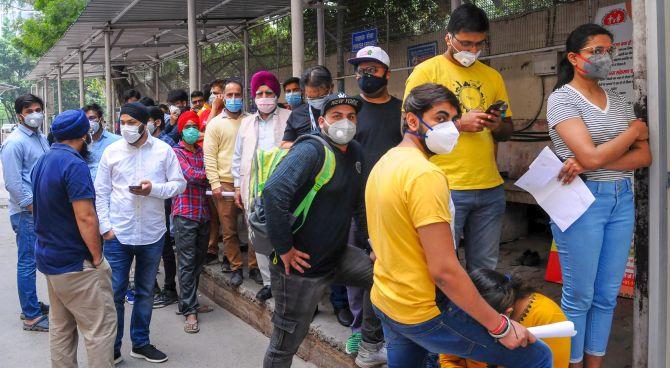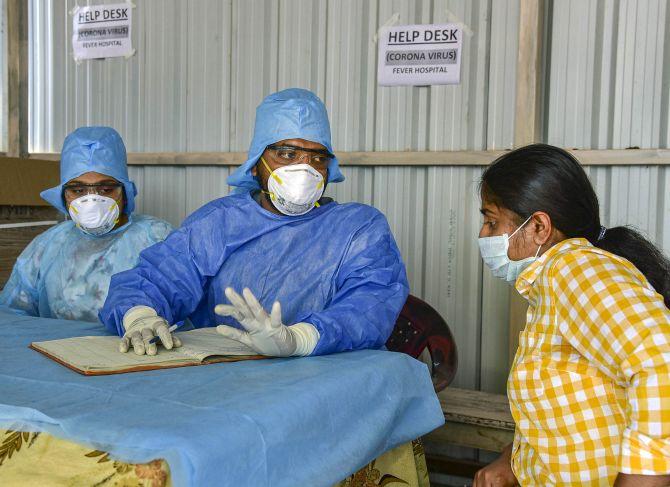'India needs to do what India can do, which is to keep the number of cases down.'
'If it manages to keep the cases down, it will save lives.'

Dr Bharat Pankhania, senior clinical lecturer at the College of Medicine and Health, University of Exeter, UK, has worked with communicable diseases, public health, respiratory diseases and the care of the elderly.
He has extensive experience in offering strategy and advice for national communicable disease control action plans, both in the UK and internationally.
"If you don't succeed in keeping the number of cases down, then Indians will die," Dr Pankhania tells Vaihayasi Pande Daniel/Rediff.com.
There have been several global virus outbreaks, be they SARS (Severe Acute Respiratory Syndrome), bird flu, swine flu and others. It appears that the coronavirus epidemic is much more serious.
Is it that this virus is particularly more deadly?
Or is it there is just much more awareness being spread on social media, as well as the false videos/info on social media as well etc?
This is a new virus.
As it is a new virus, there is a lot we don't know about it.
It infects people. It harms people. It causes problems.
This isn't a case of hype. This is a real problem. This is a real issue.
The good thing about social media, and all, is that it holds (national) governments to account, which is not a bad thing.
Because you could easily sort of get away with: 'I didn't know anything about it, so I did nothing about it.'
Whereas now governments can't do things like not doing anything, because by social media they are put under pressure -- this is important. This is serious.
India? I have my concerns, full stop.
Because in India there is lack of control and command. There is lack of command of how are you going to stop it.
This is very difficult. This is a huge problem for India.
Because in India we also have a population that may or may not observe instructions. And obeying instructions is very important.
A lot of comparisons have been made between this virus and SARS, swine flu, bird flu, Ebola etc. In terms of fatalities and in terms of its ability to reproduce and become a new virus, how does this virus compare to other viruses at the heart of large global outbreaks?
The SARS virus was not so infectious. But it was more fatal. Because it was not so infectious it did not infect a lot of people and therefore it did not kill a lot of people.
The coronavirus is part of the SARS family. It is more infectious. Because it is more infectious it creates more cases. Because it creates more cases it has more deaths.
It is more harmful than the influenza virus. Much more, right. The influenza virus kills about 0.5 per cent of those people who are infected. This one kills about 1.5 per cent. So that's quite a lot.
I understand that because the fatality rate of coronavirus is not as bad as other viruses like say SARS, that may not necessarily be a good thing, because people who are mildly infected, won't know they are. Therefore it spreads faster. Is that true?
Well, yes.
That makes my control work a lot harder, because if I don't know who is clearly infected, it is very difficult to identify a clearly infectious person and remove them from circulation.
One sure way of doing it is to screen them. You can't screen the whole world. Can you?
Let me ask you about screening. India is now doing a lot of screening at airports and all that, especially thermal screening. Will thermal screening identify someone who is potentially infectious?
Thermal screening is a waste of time. It is a false reassurance. Thermal screening doesn't get you very far.
Because you could be ill with a lot of illnesses which give you temperature.
And just because you haven't got a temperature doesn't mean you haven't got the infection (coronavirus).
So thermal screening is a little bit of a ceremony. It is not an exact science. It's rubbish.
What then is the best way for an airport to screen passengers coming into a country?
It is very difficult. Like I said, it is very difficult.
But what you have to do is, you say you have come from a danger zone, I want you out of circulation. That's one way of dealing with it.
The other way of dealing with it is that you identify these people. You can take a sample. And keep them out of circulation till it comes back positive or negative.
The third way is, 'Look, you come from a danger area. Your test will not be positive for up to 14 days. So I want you out of circulation for up to 14 days.' That's another strategy.
None of these steps are probably happening in India?
India is a problem, kya karein? (what to do?)
The coronavirus is said to have mutated into two types or more. And it is possible to contract a viral infection from either or both.
As per what you told The Times, London, there is no information on how harmful the new mutated virus is, because that has happened in China and China is under a clampdown.
There is a possibility the virus can mutate elsewhere and if the place is not under a clampdown, the second virus will be equally or more harmful?
Yeah, but only China can do things like containment by locking you down.
Other countries cannot do that!
Is the mutation a good thing?
Yes, but not all mutations are in the wrong direction.
What I can say to you is that a mutation is just a mistake in reproduction.
So mutation isn't necessarily a bad thing. It can be a bad thing. It might not be a bad thing. Usually a mutation is like -- it makes the virus less potent. A mutation is just a representation of a reproductive mistake.
Generally, what I understood as a layperson, is that when it jumps from species to species (animal to man), then the first variety is less strong and then there can be a stronger variety and then there can be a less strong variety as well and so on...
Yes (hesitantly). Not necessarily. It can be rubbish and then it can be good and then it can become bad. What I mean by good is highly infective, highly pathogenic. And it changes and becomes less so. It can go in either direction.
What is it looking like so far with this virus?
It is too early to tell. It is too early to tell. And it is not as if it is losing its potency and there is no evidence that it is becoming more vigorous.
So that doesn't show anything about the virulence of the mutated virus?
Correct.
 IMAGE: Dr Bharat Pankhania.
IMAGE: Dr Bharat Pankhania.What is the overall situation as far as you can see, and as per whatever information is available to you, at Ground Zero or at alternate places where the crisis is severe?
There is still no cure, correct? Or any way in which it is being limited? And the status on containing this virus?
There are people working on developing a vaccine.
And then there are people working very hard on trying anti-retroviral drugs as a treatment option for managing this coronavirus infection.
People are developing the vaccine. It hasn't been developed. It is not easy to develop it. The vaccine isn't available at the moment.
It won't be available any time soon, either?
Correct.
As far as containment goes, there is no containment yet. It is getting worse at the moment?
No. You got to practice containment because containment is the only option you have.
India needs to do what India can do, which is to keep the number of cases down. If it manages to keep the cases down, it will save lives.
If you don't succeed in keeping the number of cases down, then Indians will die.
India declared it is not just cases coming from outside. It acknowledged there was a community spread, but no fatalities have been reported.
To say that there are no casualties, but that there is transmission happening in the community (person to person), what does that mean? Good or bad?
In India when a man dies you don't know whether he died of coronavirus or a heart attack or TB, do you?
Well then you know the answer. If you are not specifically looking for it, how will you know?

So just because India is not showing deaths and not showing numbers, do you think India can still be facing a large problem given the population, given the way people move about (in close quarters) and the lack of precautions?
Yes, that is correct.
Who is this illness coming for? So far it seems to affect fatally only elderly people at the moment and people with pre-conditions. Not children? Still no information on how it affects pregnant women.
It will affect everybody. We just think it will affect older people more.
It depends on how strong your constitution is.
Yes, the condition of your health. Depends on how well you are otherwise.
It seems to affect people at the extremes of the age spectrum.
How cautious can one be?
Sitting in Mumbai, for instance, which is a very heavily populated city and you are exposed to multitudes of people and possibilities of multiple transmissions of anything people to people, you wonder what you can do.
You have to be as cautious as you can possibly be.
India is a problem, I told you.
We just don't have the desire to be clean. And you haven't got the desire to be clean, then you have a case of kya karein> (what to do?).
You are going to die if you don't take care.
I am trying to sort of say India needs a large programme of health promotion, health protection. This is a good investment.
If you invest in health protection, you create less deaths, less cases.
But you have to have a political will to invest in these things. And if you don't invest, you have got a problem.
You cannot create a good (health) culture in seconds. It takes days, years to create a sense of: Be careful.
When you start unravelling the implications of the spread of coronavirus in the context of India it is sort of mindboggling.
I mean like I have just picked up the newspaper and I don't know how many people (with clean hands) have handled it.
I have just bought vegetables and I don't know if ten people have handled the same potato.
So you worry about your level of risk all the time. Is it important to be worried about all this?
It is important to be aware. Absolutely!
It is important to be aware of everything. Clean your hands, don't be dirty and don't spit in the streets!
The options available to protect yourself from coronavirus in India, because of the crowds and population: Basically just washing your hands frequently, washing them well, rubbing them and all that.
In the absence of soap and water, a hand sanitiser with more than 60 per cent alcohol. Correct?
Correct!
Well you can take care. Wash your hands and don't get infected, that's the bottom line.
Masks can do something, but actually it is precious little?
No. What's the point? Rubbish.
Also, it is too early to tell what the casualties will be like for coronavirus. Right now, it is about 3,000 worldwide. But it is very early in the course of this disease. Correct?
Correct.
It can go up much higher than what people are expecting?
It will go up much more. We expect more cases. I expect more cases. I expect more illness. I expect more deaths.
Coronavirus, according to so many news articles, has arisen in the wet markets of China where there can often be -- so the reports say -- a lot of mixing of body fluids of dead and live animals of all kinds.
India's markets are not very hygienic either, so why can't such a situation arise in India?
Why till now has it been that these kinds of viruses always emanate from China?
It doesn't. It happens anywhere.
You mean it can very well happen anywhere, in India too? We may not know about it?
Of course, of course. It can happen anywhere.
These things happen. These things happen anywhere. Anywhere. Anywhere. Anywhere. Anywhere!
It can happen anywhere where you have malpractice.
China has more population. More animals. More things. So, of course, it has more damage you know. It can happen anywhere.
What kind of travel should one avoid right now, especially if you are based in India? Should one avoid any non-essential air travel?
No. Life has to continue. It is important. Life has to continue.
You just have to take precautions as a process and you take care. So you say to yourself: 'You will do this and you will do that. And won't do this and won't do that'.











 © 2025
© 2025